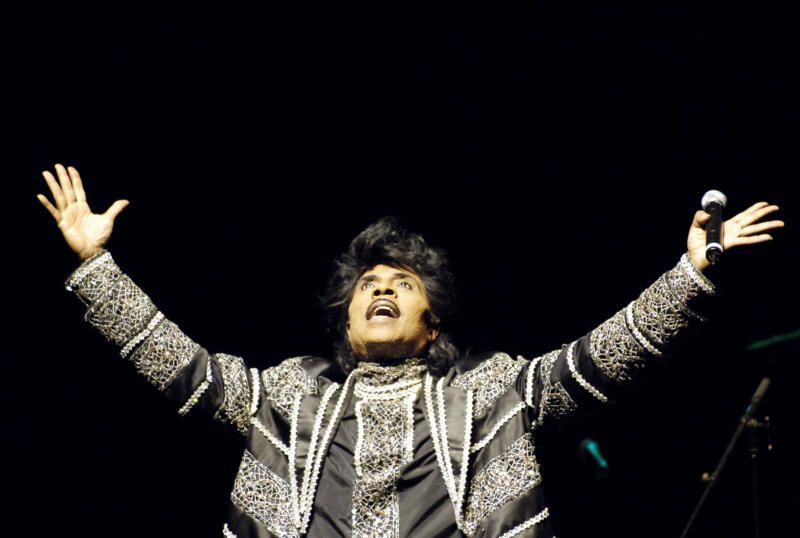Religion’s hold on Little Richard, rock’s sex-amped founder
Well before the notorious wild parties of rockers in the 1960s, Richard spoke fondly of nightly orgies in his hotel rooms where he was both an avid bisexual participant and a self-gratifying voyeur (STEPHANE DE SAKUTIN)
New York (AFP) – A ferocious pianist with a madcap rubberband of a voice and bombastic stage personality, Little Richard, who died Saturday at 87, will go down in history as a key architect behind years of rock’s music world dominance.
But though his pancake makeup and gaudy costumes oozed sexual ambiguity, Little Richard’s upbringing in the church underwrote his complicated lifelong journey with religion and sexuality.
Born Richard Wayne Penniman in the southern US state of Georgia, the performer was raised attending Seventh-day Adventist, Baptist and Holiness churches, where he would linger for the music, aspiring to a life as a minister.
He took early inspiration from Sister Rosetta Tharpe, an influential artist of the 1930s and 1940s and forerunner of rock, who fused gospel and spiritual lyrics with the hip-shaking rhythms of R&B.
As a teenager he traveled around his home state as a part of medicine and minstrel shows, and by the 1940s and 1950s was a cross-dressing performer who later sang alongside strippers and drag queens.
Little Richard’s star was born in the mid-1950s with his defining hit “Tutti Frutti,” which intoxicated legions of teenage fans eager to break loose from buttoned-up mid-century America.
But it was only after re-writing a cheeky section of the song referencing anal sex that his producer released it.
As his fame soared Little Richard tore down barriers as a sexually fluid black man coming from the US south where the legacy of slavery and enduring segregation were still very much open wounds.
He splashed onto the then-macho world of rock and changed it forever, electrifying the stage with his frenetic rhythms at the keys, sky-high pompadour and peacockish garb.
His flamboyant look echoed for generations among stars who would bend gender norms onstage including Prince, David Bowie, Michael Jackson, Elton John and Mick Jagger.
And long before the notorious wild parties of rockers in the 1960s, Richard spoke fondly of nightly orgies in his hotel rooms where he was both an avid bisexual participant and a self-gratifying voyeur.
Offstage he would describe himself as gay, bisexual and much later “omnisexual.”
“We are all both male and female. Sex to me is like a smorgasbord. Whatever I feel like, I go for,” he’s quoted as saying in GQ in 2012.
But even his wildest days, Richard maintained his childhood interest in the church and would even read Scripture to women in the morning after his orgies.
– ‘Demonic’ rock –
At the height of his fame in 1957, Richard abruptly canceled a tour of Australia mid-way and became a missionary for the evangelical Church of God.
Richard had seen several signs he took as divine — a fireball in the sky revealed to be part of Russia’s Sputnik first satellite launch, and news that a plane on which he had been due to return had crashed.
After his conversion, he married Ernestine Campbell, a formal-mannered secretary from Washington who was part of the church, and they adopted a son.
Richard’s sole marriage lasted four years, with the couple divorcing after Richard was arrested for approaching men in a restroom. Richard — resentful that rock ‘n’ roll was taking off without him — soon returned to music with a triumphant tour of England.
He again turned more deeply into religion in the mid-1970s and mid-1980s after the deaths of his brother Tony and his mother. By the late 1980s he had managed to merge his religious life and his stage persona, touring as a preacher and officiating at flashy celebrity weddings.
His views on sexuality remained complicated, however.
In 1995, he told Penthouse magazine, “I’ve been gay my whole life and I know God is a God of love, not hate.”
But he re-emerged in public in late 2017 to speak to an evangelical church television station in Illinois, calling same-sex attraction “unnatural” and deploring Western society’s growing tolerance for transgender people.
Reverend Bill Minson, a close friend of the late performer, called Little Richard “a GIANT FOR JESUS” in a post following the singer’s death.
“In my nearly 41 years of gospel ministry I never met anyone who exemplified the love of CHRIST and honored GOD faithfully more then Rock & Roll King Little Richard,” Minson said.
In his biography, Richard said he was convinced that God made him famous so he could become a preacher.
And though he once dubbed himself the “inventor” of rock and graciously accepted praise that he was among its founding fathers, Richard also contradicted himself with sharp words for the genre he fashioned at the piano.
“My true belief about rock ‘n’ roll — and there have been a lot of phrases attributed to me over the years — is this: I believe that this kind of music is demonic.”
Disclaimer: Validity of the above story is for 7 Days from original date of publishing. Source: AFP.


